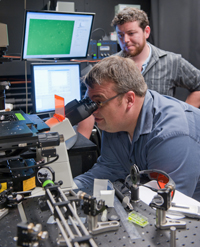Syracuse Views Summer 2025
We want to know how you experience Syracuse University. Take a photo and share it with us. We select photos from a variety of sources. Submit photos of your University experience by sending them directly to Syracuse University News at…

 The award will also support the development of teaching materials and laboratory demonstrations in the areas of biophysics and soft condensed matter physics that will be used in selected Central New York high schools. Forstner, assistant professor in the Department of Physics, will work with graduate students to develop the materials and help teachers incorporate the new units into their curricula. Additionally, the NSF funds will support summer internships for highly motivated high school students to work in Forstner’s lab.
The award will also support the development of teaching materials and laboratory demonstrations in the areas of biophysics and soft condensed matter physics that will be used in selected Central New York high schools. Forstner, assistant professor in the Department of Physics, will work with graduate students to develop the materials and help teachers incorporate the new units into their curricula. Additionally, the NSF funds will support summer internships for highly motivated high school students to work in Forstner’s lab.